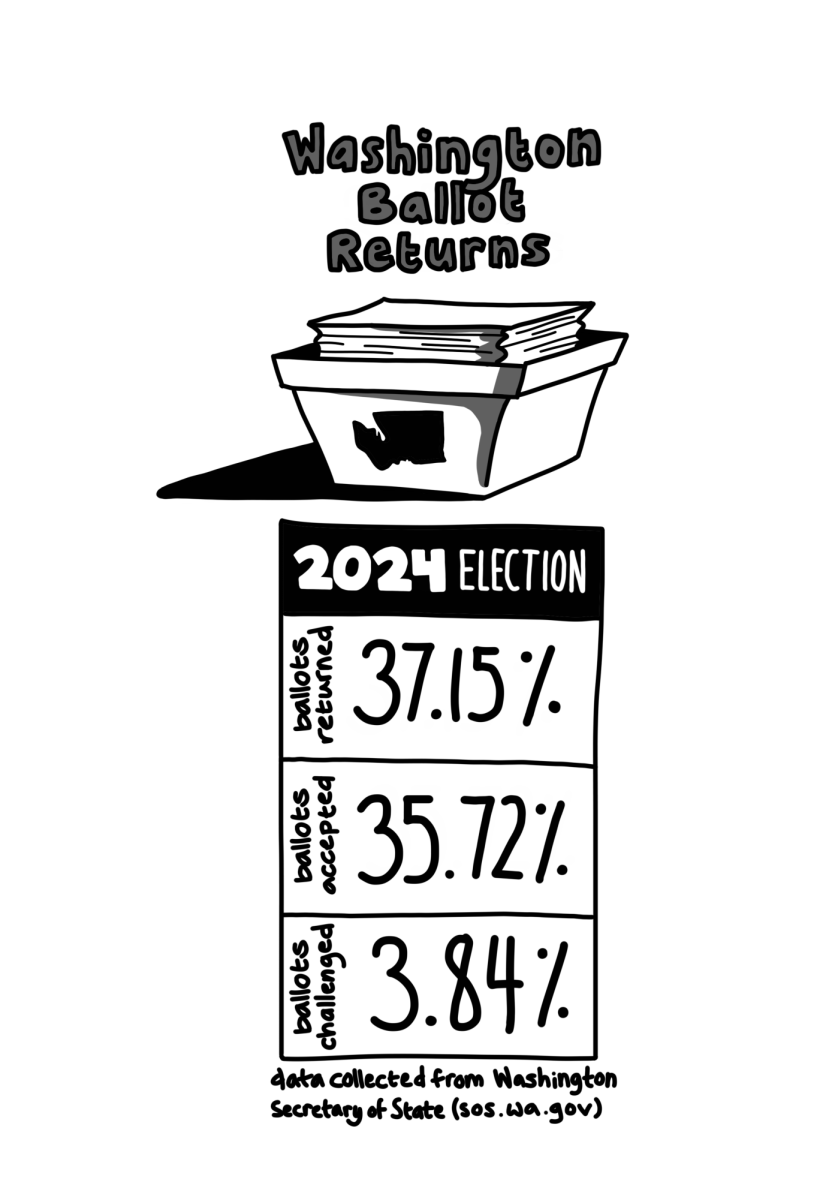
ASWC held its first Town Hall of the new decade on Wednesday, March 3, as numerous students, faculty and staff members gathered in Olin Hall to discuss everything from campus security to financial aid to the evolution of academic departments and course schedules.
A report by Chair of the Faculty and Associate Professor of Astronomy Andrea Dobson on the faculty’s recent approval of 3-2 course schedules was on the forefront of the night’s agenda, which included brief news updates from ASWC executive council members on their respective committees followed by addresses from guest speakers Dobson and President George Bridges, who each participated in question-and-answer sessions.
The faculty voted on Nov. 4, 2009 in favor of allowing individual academic departments to reduce professors’ course loads from six courses per year to five in an effort to reduce workloads. Dobson, who assumed her role as Chair of the Faculty in 2009, focused her Town Hall address on outlining the goals of the switch, disclosing aspects of the faculty’s decision-making process and addressing various challenges and setbacks.
“Last year, an elected faculty committee called for responses from various departments and interdisciplinary programs to the basic question of: Could you move to a five-course load without messing with general education, making the size of the Encounters section go through the roof, mutilating your major? Could you be equitable in the distribution of workloads among the faculty in the department?” Dobson said.
She commented that the faculty committee allowed the transition to move forward under the proviso that students’ classroom experiences be unaffected.
“The foremost thing for making this happen has been that you can’t mess with the student experience,” Dobson said. “What you guys experience when you’re in the classroom has to be the primary criterion for whether faculty in various departments will move to a five-course load or not.”
ASWC had previously voiced its concerns about the proposed course schedule in an open letter to the faculty issued on Tuesday, Nov. 3, 2009. The letter argued that the proposed switch could negatively affect the quality of education at Whitman by increasing class sizes and reducing the number of available courses. Despite the letter’s objections, the faculty voted overwhelmingly in favor of adopting the 3-2 schedule starting in the 2010-2011 academic year.
In the aftermath of the vote, many students took advantage of Wednesday’s Town Hall to continue raising questions and concerns about the course schedule. Senior ASWC Student Advocacy Coordinator Will Canine protested the faculty’s decision not to petition students for input when planning the 3-2 transition.
“You said that your first concern in making these decisions has been the student experience and the ways we feel the change in the classroom, and I want to be able to give you the benefit of the doubt on that,” Canine said in response to Dobson. “But you’ll have to forgive me if I feel that’s a little bit disingenuous. This is the first time that students on a large scale have been addressed about this issue, and I’m just curious why, when ASWC sends a letter voicing our concerns about the 3-2 . . . many members of the faculty met our letter with open hostility.”

Dobson responded by acknowledging the tensions which ensued after the vote and stressing the importance of future communication between students and faculty.
“I didn’t [consider students’ input], it didn’t occur to me,” said Dobson. “It flat out didn’t occur to me in September to say, ‘Yo, what do you all think about this,’ because we were already two years into the process. And I’m sorry.”
Dobson looked to dispel certain myths about the proposed switch by assuring students that the number of courses and classroom spots available to students will not be as drastically reduced as they may think.
“Part of the concern I know students have had is that this sounds like we’re just reducing the number of courses by one in six,” Dobson said. “Part of the data we have looked at from the registrar’s office suggests that . . . there’s an awful lot of slack [for classroom spots].”
She explained that when students over-enroll in classes during registration, it appears that there are fewer spots available for students than actually exist.
“There actually are a lot of spaces when you look more closely at registration numbers, with the exception of two or three departments, and we’re going to try to do something about that,” Dobson said.
One solution Dobson proposed is to redesign the college’s registration system to help students prioritize which courses they want to take most. She believes that if the registration period is staggered into different periods of time, and students are unable to register for all their classes at once, more spots will be available for students to enroll in their first-choice classes. Transfer students, Jan-starts and first-year students will especially benefit from this system.
“We don’t want first-year students to find that classes they absolutely have to have are packed full,” Dobson said.
As senior class senator Ellie Klein pointed out, however, over-enrolling in classes is an important part of the registration process because it allows students to sample classes early on in the semester. She believes Whitman students would benefit from a “shopping period,” allowing them to try out many different courses for a period of time before deciding which ones they want to keep in their schedules.
Dobson agreed that the process of registering for classes needs to reevaluated in order to address students’ concerns. She promised to make a note of Klein’s suggestions and also added that students may have an easier time deciding on classes in the future thanks to a new federal law requiring colleges to release lists of required textbooks to students before they register for classes.
For students in a number of departments, however, the process of selecting classes may prove more difficult. Another concern of the 3-2 transition is that certain academic departments face greater challenges in adjusting to the new course schedule due to the pressures of enrolling students and limited human resources.
“Geo is one of the departments that can’t do this without some help,” Dobson said. “Music has trouble making a go of it because of the immense amount of time spent one-on-one with students. A couple years ago . . . there were people in first-semester organic chemistry classes sitting on the floor, and we’ve made some serious efforts to make sure that doesn’t happen again.”
Dobson’s comments and questions from students throughout the night prompted one student to inquire about what aspects of the 3-2 schedule students should be excited about.
“One of the senior faculty members who taught Encounters last semester, and who had a course reduction, was absolutely blown away by the extra amount of time he was able to spend one-on-one in talking about writing with his first-year students,” Dobson said when describing some of the benefits students can look forward to when professors’ workloads are redistributed. “That’s what you ought to see, is more time for your faculty to be there.”













